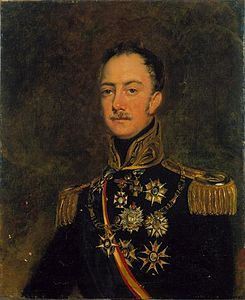António Severim de Noronha
|
His Excellency The Duke of Terceira GCC GCTS GSJS GCICVV FC |
|
|---|---|
 |
|
| President of the Council of Ministers of the Kingdom of Portugal and the Algarves | |
|
In office 16 March 1859 – 1 May 1860 |
|
| Monarch | Pedro V |
| Preceded by | Duke of Loulé |
| Succeeded by | Joaquim António de Aguiar |
|
In office 26 April 1851 – 1 May 1851 |
|
| Monarch | Maria II and Fernando II |
| Preceded by | Marquess of Tomar |
| Succeeded by | Duke of Saldanha |
|
In office 9 February 1842 – 20 May 1846 |
|
| Monarch | Maria II and Fernando II |
| Preceded by | Duke of Palmela |
| Succeeded by | Duke of Palmela |
|
In office 20 April 1836 – 10 September 1836 |
|
| Monarch | Maria II |
| Preceded by | José Jorge Loureiro |
| Succeeded by | Count of Lumiares |
| 16th Captain General of the Azores | |
|
In office 5 April 1829 – 4 June 1832 |
|
| Monarch | Maria II |
| Preceded by | Henrique de Sousa Prego |
| Succeeded by | Angra Regencry |
| 11th Governor of Grão-Pará | |
|
In office 19 May 1817 – 20 July 1820 |
|
| Monarch | João VI |
| Preceded by | Count of Arcos |
| Succeeded by | Romualdo Antônio de Seixas |
| Personal details | |
| Born | 18 March 1792 Lisbon, Kingdom of Portugal |
| Died | 26 April 1860 (aged 68) Lisbon, Kingdom of Portugal |
| Spouse(s) | Maria José do Livramento e Melo Maria Ana Luísa Filomena de Mendonça |
| Religion | Roman Catholic |
D. António José Severim de Noronha, 1st Duke of Terceira, 1st Marquis of Vila Flor (18 March 1792, Lisbon – 26 April 1860) was a Portuguese military officer, statesman and a leader of the Constitutionalist side in the Liberal Wars, as well as a Prime Minister of Portugal.
António José de Sousa Manuel de Meneses Severim de Noronha was born in Lisbon, on 18 March 1792, first son of António de Sousa Manuel de Meneses Severim de Noronha, 6th Count of Vila Flor, and Maria José de Mendonça, 6th daughter of the Count of Vale de Reis. Born into a noble families, he was automatically hereditary heir to historic possessions and properties of one of the oldest and wealthiest families in Portugal.
He was just two years old, when in 1795, his father died, leaving him the title of Count of Vila Flor servant to the Queen, thusby inheriting an immense fortune, that included real estate and a personal income. Among others, he inherited the commendations to Santa Maria de Pereira, São Pedro de Calvelo, São Tiago de Cassourado, São Vicente de Figueira and de São Geris de Arganil, as well as various annunities (such as 200$000–500$000 réis in his post as fishing sheriff of Lisbon). Similarly, he became patron of the Convent of the Order of Capuchin Friars Minor of Nossa Senhora dos Anjos, in Sobralinho, the chapel of Nossa Senhora do Pópulo (within the Convent of Boa Viagem), the hermitage of Nossa Senhora da Conceição do Portal, in the town of Alhandra, and the administration of various morgadios (that included two estates in Alverca do Ribatejo, the Lezíria da Corte da Vila and Casal de Borges, in Azambuja, the Herdade da Aravia, in Avis, and the houses of São João da Praça and morgado of Braço de Prata, in Lisbon.
Destined to a life at Court, he was instructed in the typical teachings bestowed on children of the Portuguese high nobility for the period, that included military arts and political life. In this context, in 1797, with less than four years of age, he received a commendation in the Order of Christ. Later, at the age of 12, he would profess religious orders (as a friar in the Order) at the Convent of Nossa Senhora da Luz.
Meanwhile, on 10 February 1802, the nine-year-old António José, had joined the 4th Regimental Cavalry as a cadet, to which he would be promoted to ensign by 24 June 1807. It was in this commission that Noronha was assigned, when on 20 November 1807, French troops invaded, under the command of Jean-Andoche Junot to begin the Peninsular War. Not prepared to submit to the French, he resigned his commission in the army, accepted by D. Pedro de Almeida Portugal, 3rd Marquis of Alorna, then commander of Portuguese forces.
...
Wikipedia
